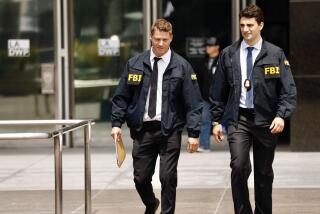Dowie gets 31/2 years in U.S. prison
- Share via
Former public relations and newspaper executive Douglas R. Dowie was sentenced Tuesday to 3 1/2 years in federal prison for defrauding city taxpayers, adding a painful coda to a career that once scaled the heights of Los Angeles media influence and political power.
U.S. District Judge Gary Feess told Dowie that he had abused the public’s trust and lost his “moral compass” in masterminding a scheme to overbill city government for consulting services.
But in his first courtroom statement on the case, Dowie defiantly insisted that he was wrongfully convicted May 16. After he was sentenced, he said, “I am innocent, and I will appeal.”
In contrast, co-defendant John Stodder Jr., 51, was contrite, accepting responsibility. He received a 15-month sentence.
The scandal rocked Los Angeles City Hall, where Dowie had been a confidant of then-Mayor James K. Hahn. It spurred ethics reform and is credited with helping persuade voters to elect Antonio Villaraigosa mayor. It also bloodied one of the nation’s premier public relations firms: Dowie’s employer, Fleishman-Hillard. In 2004, the firm paid the city $6 million to settle a lawsuit claiming overbilling, mainly to the Department of Water and Power.
Dowie, 58, was the central figure in the fraud -- “the big fish,” according to the prosecutor, Assistant U.S. Atty. Cheryl O’Connor Murphy. Dowie, a former managing editor at the Daily News of Los Angeles, headed Fleishman-Hillard’s Los Angeles office.
He earned as much as $330,000 a year and built a bustling office trading on his media and political contacts to generate multimillion-dollar fees. The firm’s DWP contracts alone amounted to $3 million a year.
The St. Louis-based company, with 80 offices worldwide, was never charged with a crime, though a succession of top executives from its L.A. office admitted participating -- several under grants of immunity -- and testified against their former boss.
Many of the witnesses had worked in the administrations of former Mayors Tom Bradley, Richard Riordan and Hahn, and left public service to burnish their former associates’ political images for a price.
Prosecutors had sought a maximum of 87 months in prison for Dowie and 64 months for Stodder. The defense asked for probation. Federal probation officials, interpreting complex and arcane sentencing guidelines, recommended 24 months in prison for Dowie and 18 months for Stodder.
Dowie’s lawyers, led by Thomas E. Holliday, tried to convince Feess that Fleishman-Hillard, desperate to avoid a corporate criminal indictment, threw him to the wolves and compromised his constitutional rights.
Former DWP chief David H. Wiggs, who headed the agency when it was the victim of the fraud scheme, said Tuesday that he did not believe Dowie was guilty of any crime.
Wiggs wrote a letter to Feess on Dowie’s behalf and attended the sentencing in federal court downtown. He praised Dowie’s character and honesty, saying he believed that the overbilling resulted from mistakes.
After the verdict last year, juror John W. Mann said the evidence “indicated there were guilty parties higher up the ladder than Dowie or Stodder. We were definitely wondering why there weren’t other indictments.”
Mark Beck, the Los Angeles lawyer representing the company, said the firm spent thousands of hours investigating the case and concluded that there was no basis for believing any others were involved. He said Fleishman turned over thousands of pages of billing documents and 1.2 million e-mails to prosecutors, and was never charged with any crime.
But Michael J. Faber, the lawyer who represents Dowie in noncriminal matters, said Tuesday that “it was clear that Fleishman-Hillard threw Dowie and Stodder overboard. It’s very, very troubling how the government prevailed on Fleishman-Hilliard to betray two loyal and long-serving executives in order to save its own skin.”
Dowie has run up a $3-million bill for legal services for his criminal defense, Faber said. The attorney said he will soon file a lawsuit against Fleishman-Hillard to force payment of those fees.
The defense claimed unsuccessfully that Fleishman-Hillard cut off legal fees to Dowie at a critical point in the federal investigation and worked to deprive him of his constitutional right to counsel and due process of law. That claim is likely to be crucial to any appeal.
After the Enron scandal, the federal government developed policies to encourage corporate cooperation in criminal investigations. Dowie’s lawyers said those policies influenced Fleishman-Hillard to end its financial support of Dowie’s defense.
Last month, the U.S. Department of Justice revised those guidelines to rein in federal pressure on corporations.
On Tuesday, the judge said that he found Dowie “extremely calculating” and that Dowie showed “a degree of cynicism that’s beyond what I typically see.” Dowie treated the fraud as if it were “swiping half and half out of the office refrigerator,” Feess said, adding that prison time would be a deterrent to other potential white-collar criminals.
In vain, Dowie asked for probation with 2,000 hours of community service over the next three years.
“I’ve made mistakes, and for that I am very sorry. My remorse is overwhelming,” Dowie told Feess. “I should not have said, ‘Yes, sir,’ when my superiors in San Francisco and St. Louis wanted more profit.”
But later, Dowie continued to insist on his innocence.
*
More to Read
Sign up for Essential California
The most important California stories and recommendations in your inbox every morning.
You may occasionally receive promotional content from the Los Angeles Times.













